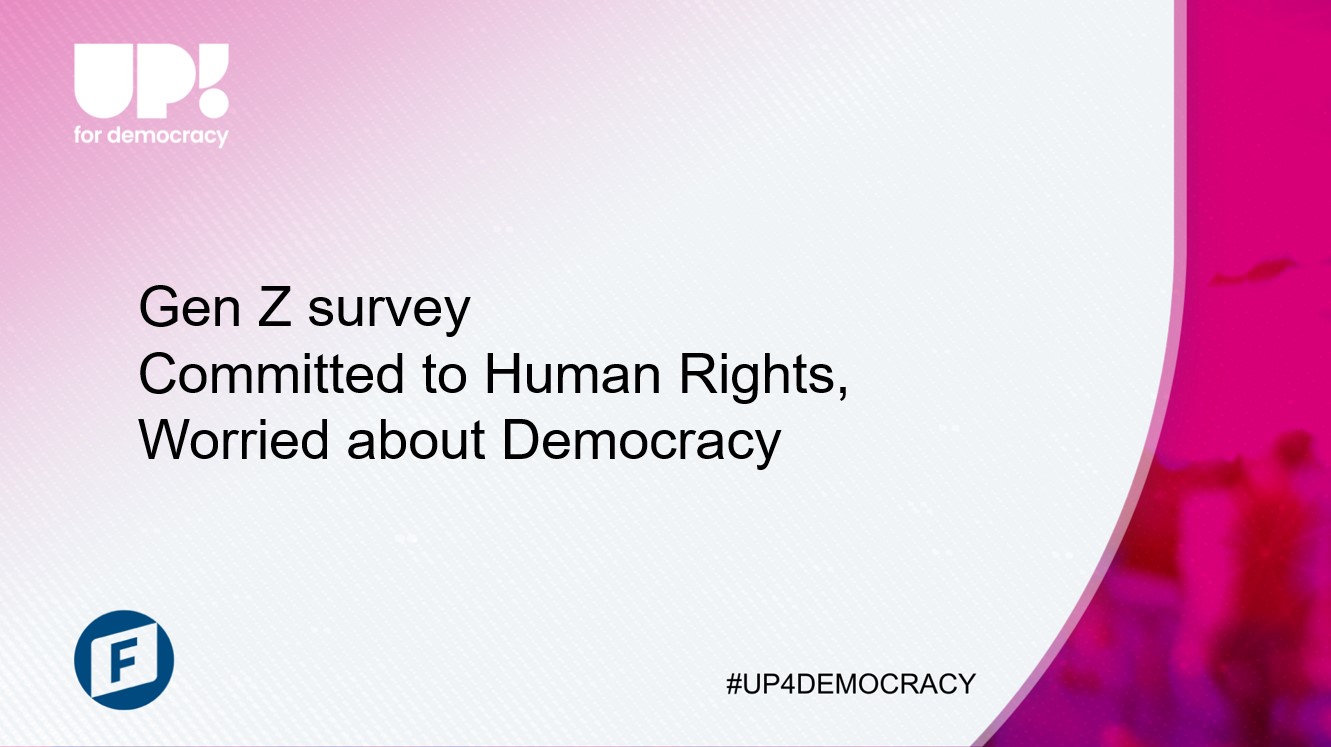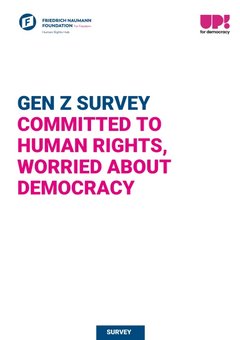Human Rights & Democracy
Gen Z Survey: Committed to Human Rights, Worried about Democracy

In Western, democratic countries, liberal ideas are losing ground with young voters, who are more likely than ever before in contemporary history, to vote for polarizing, illiberal figures. The trend has been growing for the past decade, and was further confirmed through the June 2024 European Parliament, and the November 2024 presidential elections in the United States of America.
Politicians belonging to this movement routinely sow distrust in institutions, scapegoat vulnerable groups, and question the rights-based systems that have provided secure opportunities to hundreds of millions of people in the decades since the end of World War II. Their public discourse, amplified by populist approaches, generate increasing mistrust in democracy and human rights.
Anchoring young citizens to values such as freedom, dignity, respect, and fairness, is a core objective for FNF and liberal actors worldwide. To safeguard our rights and freedoms against the populist overreach in our systems, it is imperative to listen to our youth and reflect on their concerns and the challenges they perceive for their own future.
The UP! for Democracy campaign, under which this survey was commissioned, seeks to defend and strengthen the belief and trust in democracy without shying away from the difficult conversations around its current state. The Hub also amplifies the voices of Human Rights Defenders from all around the world by sharing their stories and experiences in our Pro-democracy activists publication.
FNF’s Human Rights Hub publishes the results of this survey to our liberal community and beyond, with the hope of strengthening the attachment of young people to democratic values and attitudes.
Survey background and rationale
Growing up with the internet and new forms of communication and information sharing, today’s youth seem to face a future that is difficult to predict. The international system is continuously undermined and delegitimized, and climate-related disasters are likely to be ever more devastating. “Gen Z” will have to grapple with a world that has yet to live up to the expectations set forth in the aftermath of World War II in achieving international and sustainable peace, security, and development. Whether inside or outside Europe, threats to liberal democracy and human rights are steadily spreading.
This movement, critical of democratic, free and fair, forms of representation and government, whether from the populist extremes of the left and the right, has gained ground among disillusioned young people, increasing their share of the votes to far-right and neo-fascist groups.
The last elections in the EU (for the European parliament in June 2024) and the US (presidential elections in November 2024) and mainstreaming of populist, far right movements, are alarming trends that continue to undermine the democratic order in those countries and around the world. Results from these elections indicate a steady shift in youth perceptions and aspirations, with more seemingly open to taking a chance on illiberal actors.
In France, Germany, and Poland, far right political parties have all doubled or even tripled their share of the youth vote in the EU elections from 2019 to 2024. The French Rassemblement National secured 30% of the youth vote, up from 20%. In Germany, support to the AfD grew from 5% to 16% nationally, with some eastern regions gaining between 29% and 38% of the youth vote. In Poland, the Confederation party grew its share from 9% to 20% of the youth vote. Meanwhile. Hungary’s Gen Z have only ever known Victor Orban at the helm of their country.
The presidential elections in the US also indicated a shift of specific segments of youth, most notably young men, towards the far right messaging of Donald Trump that captured 56% of that electorate, as opposed to 40% of young women.
While recent reports and studies have unpacked the appeal of nationalist messaging, and surveys have addressed the challenges related to democracy and human rights, there seems to be a gap in understanding youth’s perceptions around human rights more specifically. What is their definition of human rights, which ones are most important to them, what are their aspirations when it comes to their personal rights and their democratic experiences?
Through this lens, the FNF Human Rights Hub has commissioned a survey targeting young people and aimed at understanding their current perceptions and expectations towards the promotion and protection of human rights and democracy. The survey collected feedback from over 5000 respondents aged 16 to 24 from the following five countries: France, Germany, Hungary, Poland, and the United States.
Key Findings
Three main elements composed the survey: an assessment of democracy and human rights globally and in respondents’ respective countries, a rating of personal importance of specific human rights, and an assessment of their experience around specific threats to their human rights. Here is a short summary of the results.
The survey revealed that Gen Z is highly aware of the fact that human rights are foundational to democratic values. While their different experiences and contexts shaped their understanding of threats to human rights, the youth from the five countries shares common perceptions around those global threats.
While being strongly committed to human rights, Gen Z feels unsatisfied with the way governments perform. With a high discrepancy between the expectations and the current conduct of governments, Gen Z is, to a concerning extent, worried about the state of democracy in their countries. The current status quo is no longer satisfying Gen Z, as they expect better protection and fulfilment of human rights.
As for the specific rights, the results reveal that the youth is aware of the contemporary risks they are exposed to. The right to privacy and the right to property top the list of the most important rights overall. This is coherent with the fact that in the information age, an unfathomable amount of data is gathered online. The topic of privacy online is also demonstrated in our publication Watching the Watchdogs, focusing on journalists and human rights defenders. Affordable housing is an omnipresent topic in the targeted countries.
On a country level, it is noticeable that youth in Hungary rates the countries performance in regards to democracy and human rights the lowest overall. This trend is present for every element of the questionnaire. They have the largest segment of respondents disagreeing on democracy being the best form of government and the biggest share of ‘not important’ ratings regarding the rating of the individual rights.
The answers regarding the question of discrimination point to the fact Gen Z feels insecure and misunderstood to a certain extent, and partially explain their dissatisfaction with their countries state of democracy.
For a more detailed presentation and analysis of the findings, please consider the booklet at the end of this article.
Recommendations
The results of this survey also serves to inform policymakers and officials in order to facilitate understanding and connecting with Gen Z. The Hub formulated some recommendations deducted from the data.
Gen Z is highly aware that human rights are foundational to democracies. Their answers around universality, as well as situational awareness, demonstrate their attachment to a value system based on freedom and equality.
While their different experiences and contexts shaped their understanding of threats to human rights, the youth from the five countries shares common perceptions around those global threats.
There was also consensus found on the importance of specific rights and freedoms. This interconnectedness of thoughts and perceptions can be correlated with the ways in which Gen Z communicate with each other, across borders and in increasingly intertwined realities.
The status of democracy in the minds of Gen Z is less obvious. While being strongly committed to human rights, Gen Z feels unsatisfied with the way governments perform. With a high discrepancy between the expectations and the current conduct of governments, Gen Z is, to a concerning extent, worried about the state of democracy in their countries. The current democratic status quo is no longer satisfying Gen Z, as they expect better protection and fulfilment of human rights and democratic values.
When lived experiences do not meet the expectations of what a democracy should provide, offering a moral compass that is driven by consistent values can appeal to this large segment of disenchanted young citizens across political divides.
The Gen Z survey reveals that the application of rights based values is a successful strategy to strengthen democracies.
Data
-
Access the complete results here.



